More on Ryan, north star & existential flashlight, here. Hat-tip This Isn’t Happiness
Table of Contents: Poetry
STOLEN DRESS
by Tess GallagherI was walking through a vast darkness
in a dress studded with diamonds, the cloth
under them like chain mail—metallic,
form fitting like the sea to its horizon. I could
hear waves breaking on the shore and far off
concertina music drifting over the dunes. What
was I doing in high heels in sand in a diamond-studdeddress that had to be stolen? Fear washed
through me, as if one of those waves had
risen up and, against all the rules of waves,
splashed me from the shoulders
down. I was wet with diamonds and fear.
A small boat held offshore with its cold
yellow light pointing a long watery finger at mewhile the stolen feeling of the dress sparkled
my location out into the universe. Thief! Thief!
came an interplanetary cry, causing me to
gaze up into the star-brilliant firmament,
for it wasn’t just a sky anymore. It had
taken on biblical stature. How had I
gotten into this dress, these unrulywaves, this queasy feeling I would be
found out? Time to run! my heart said,
pumping away under its brocade
of diamonds. Strange vacancies had
accumulated after all my sleep-plundered
nights. Thief! came the cry again, as if
I should recognize myself. And I did.I flung those high heels into the depths,
took up my newfound identity, and without
the least remorse, began to run those diamonds
right out of this world.
One of life’s distinct pleasures is watching segments of a Mousetrap-like contraption give way to one another; after each clever, unlikely & off kilter span there is always the gentlest, most elegant of handoffs…. it’s like reading this poem, and the silver bearing that drops in at the beginning rolls out a swirled marble, a world…. Poetry Magazine, March 2019
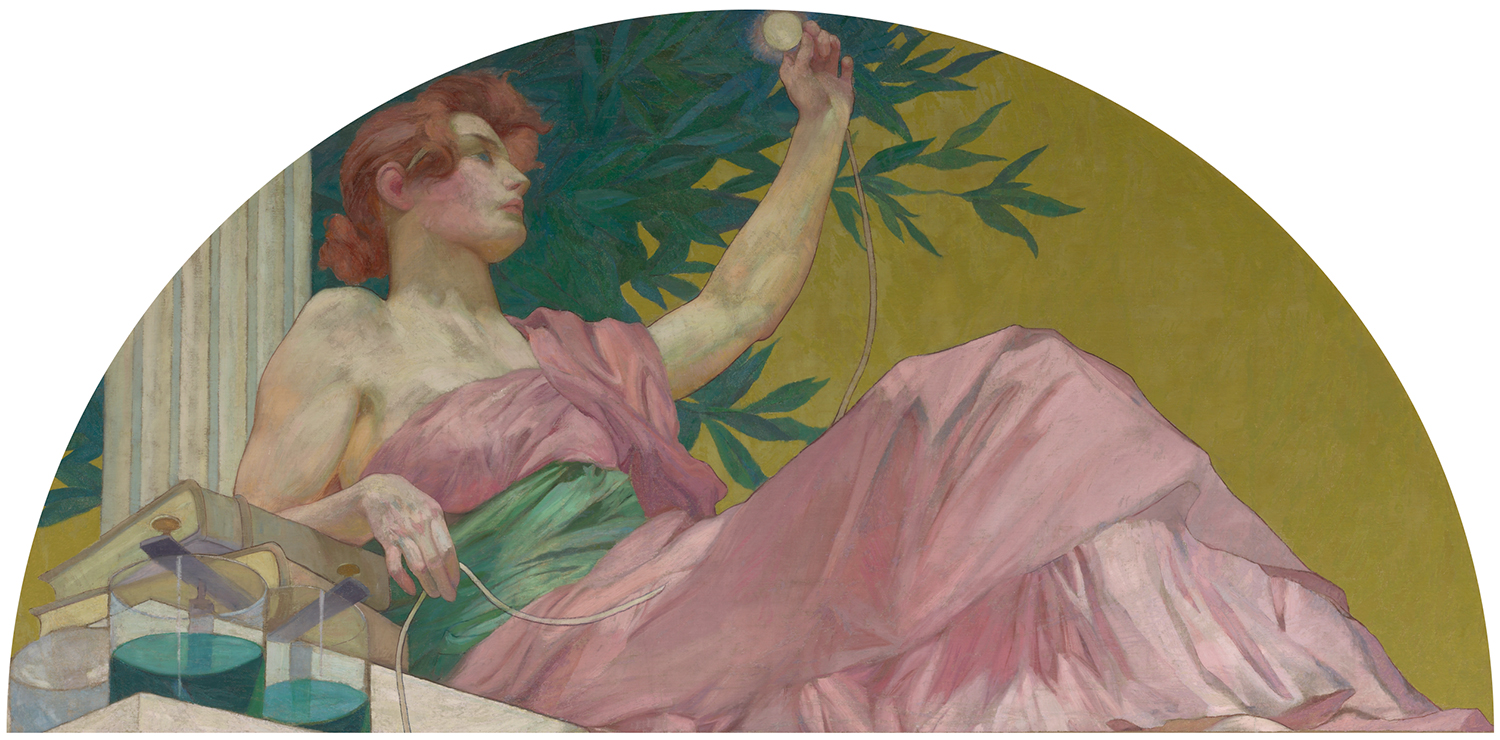
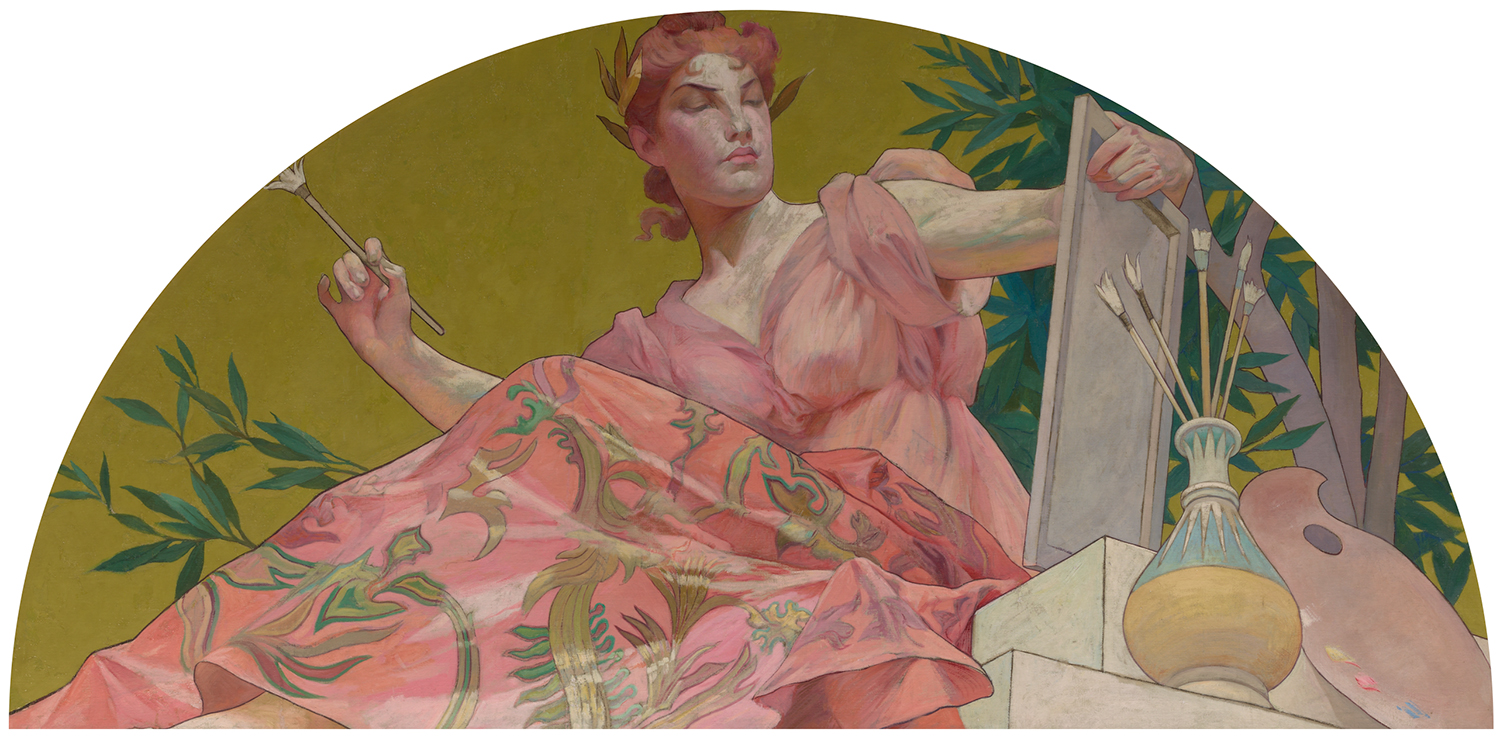
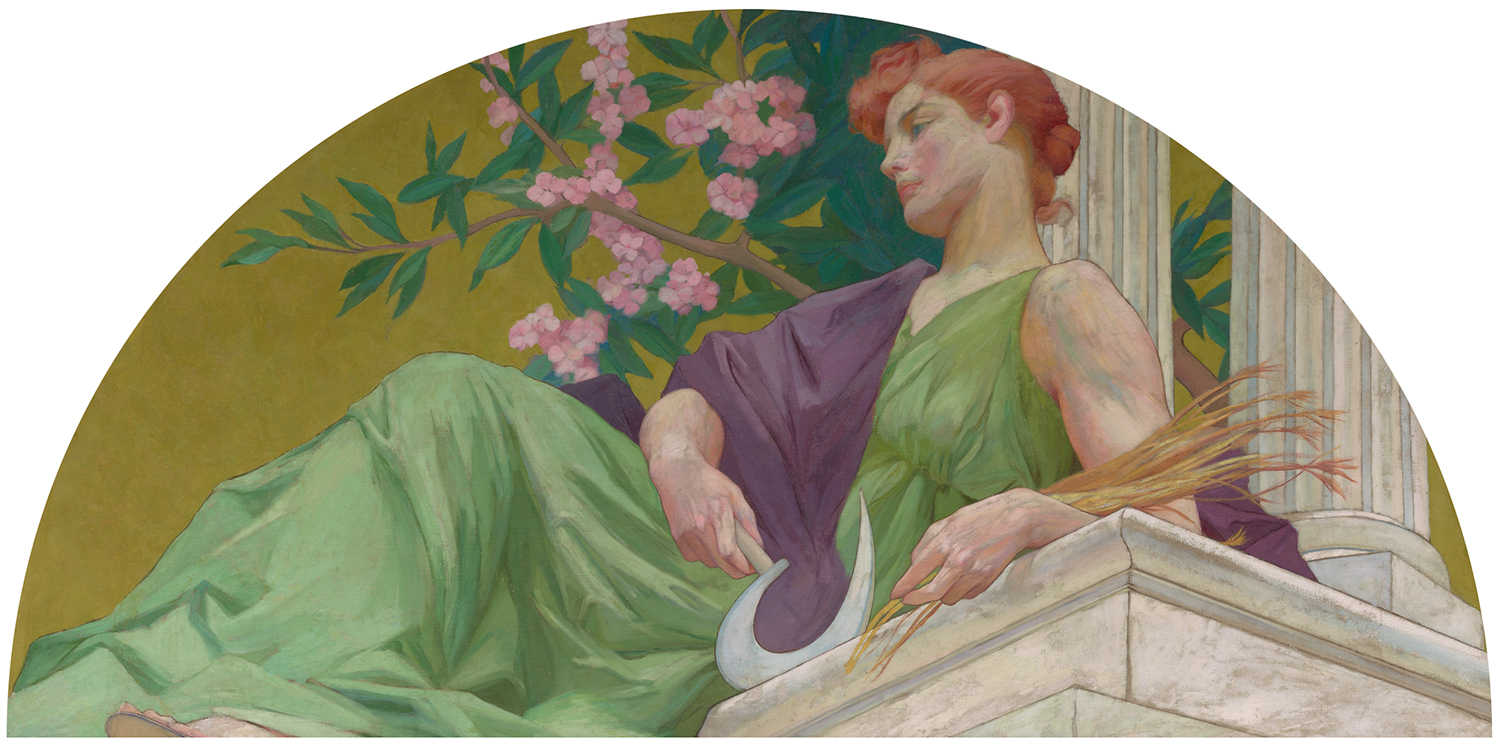
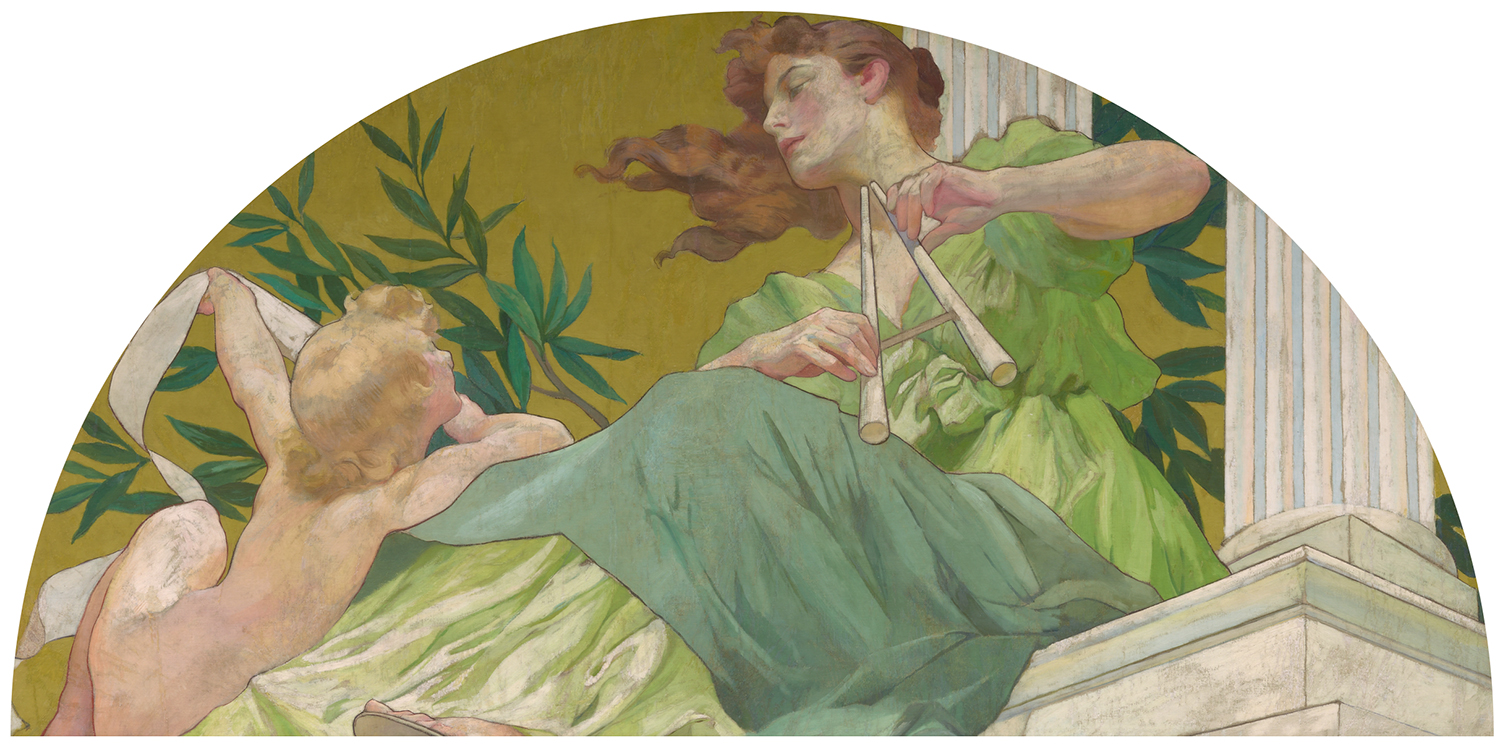
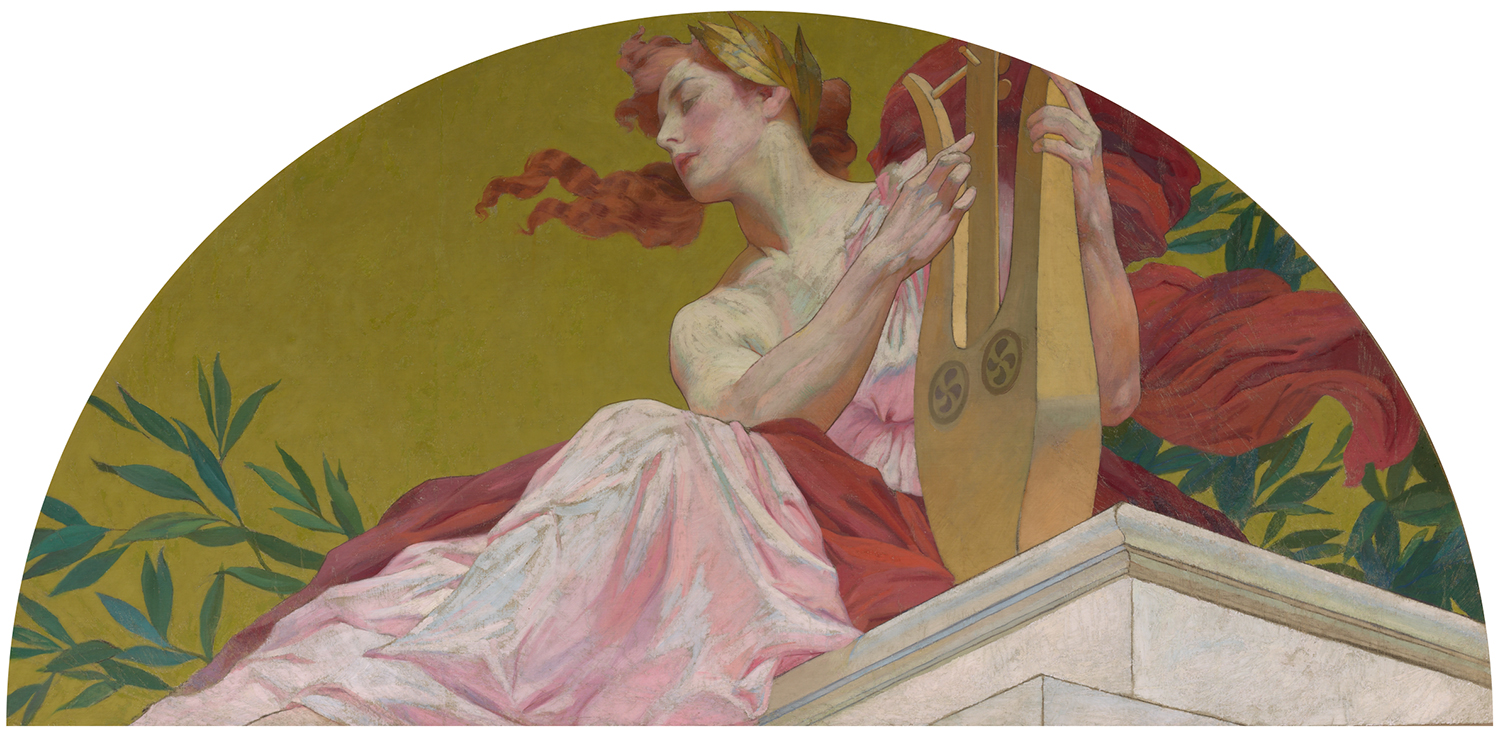
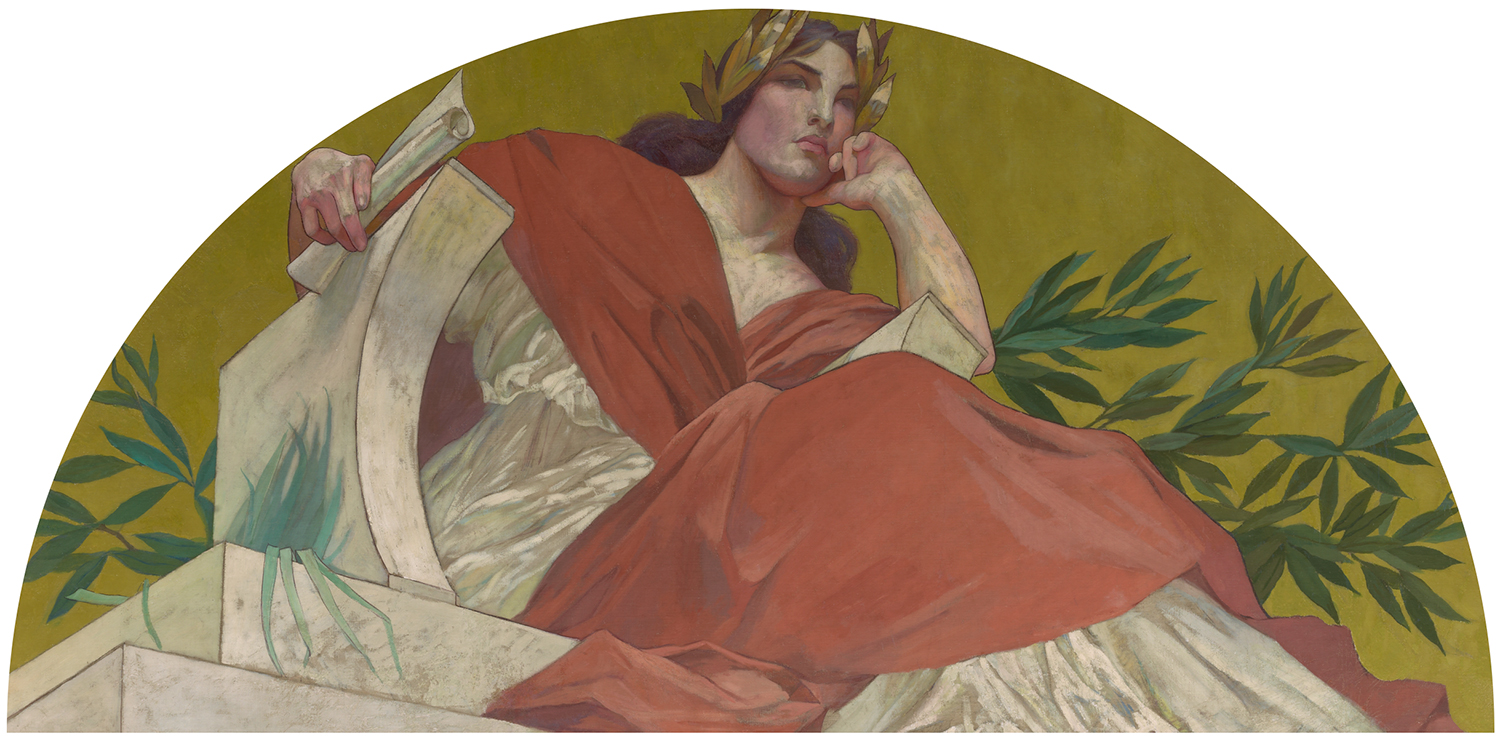
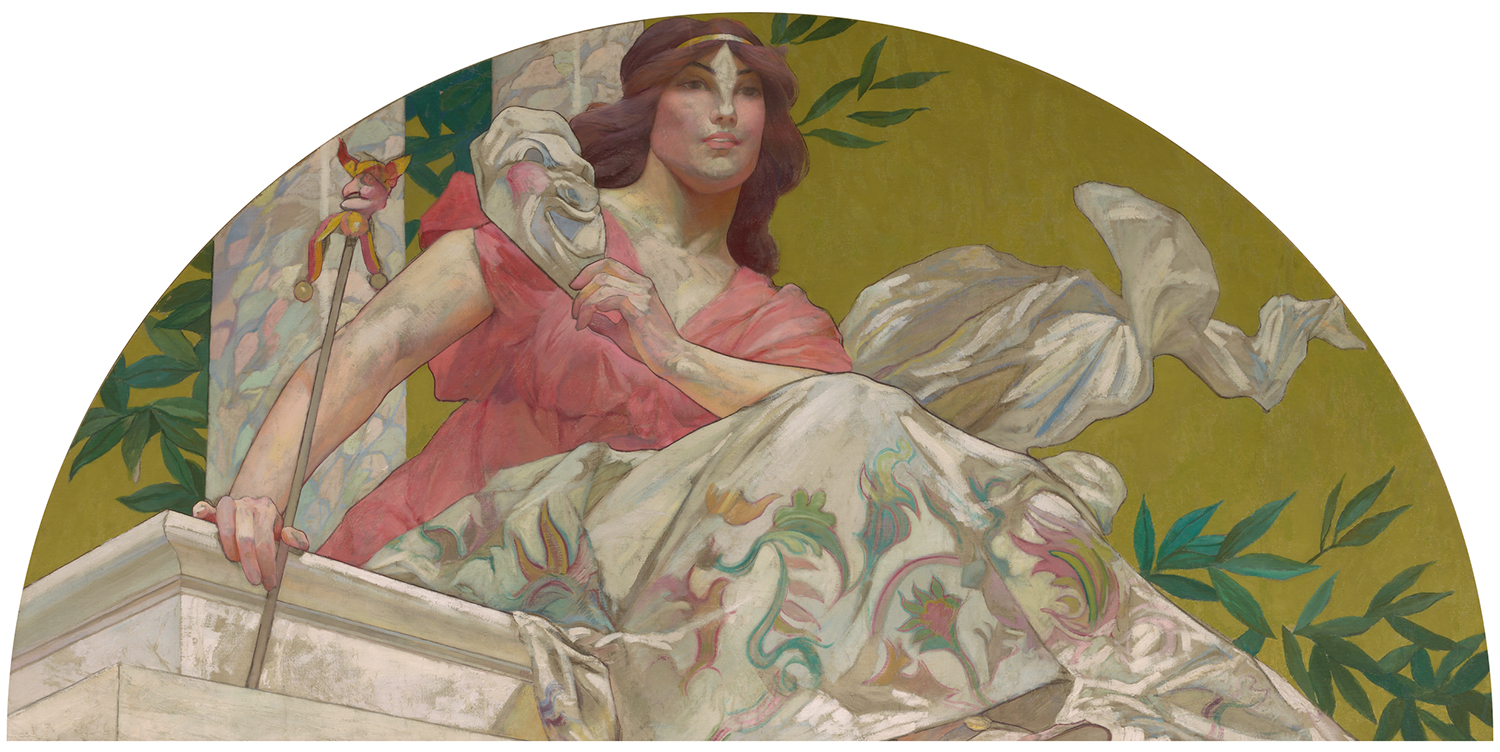
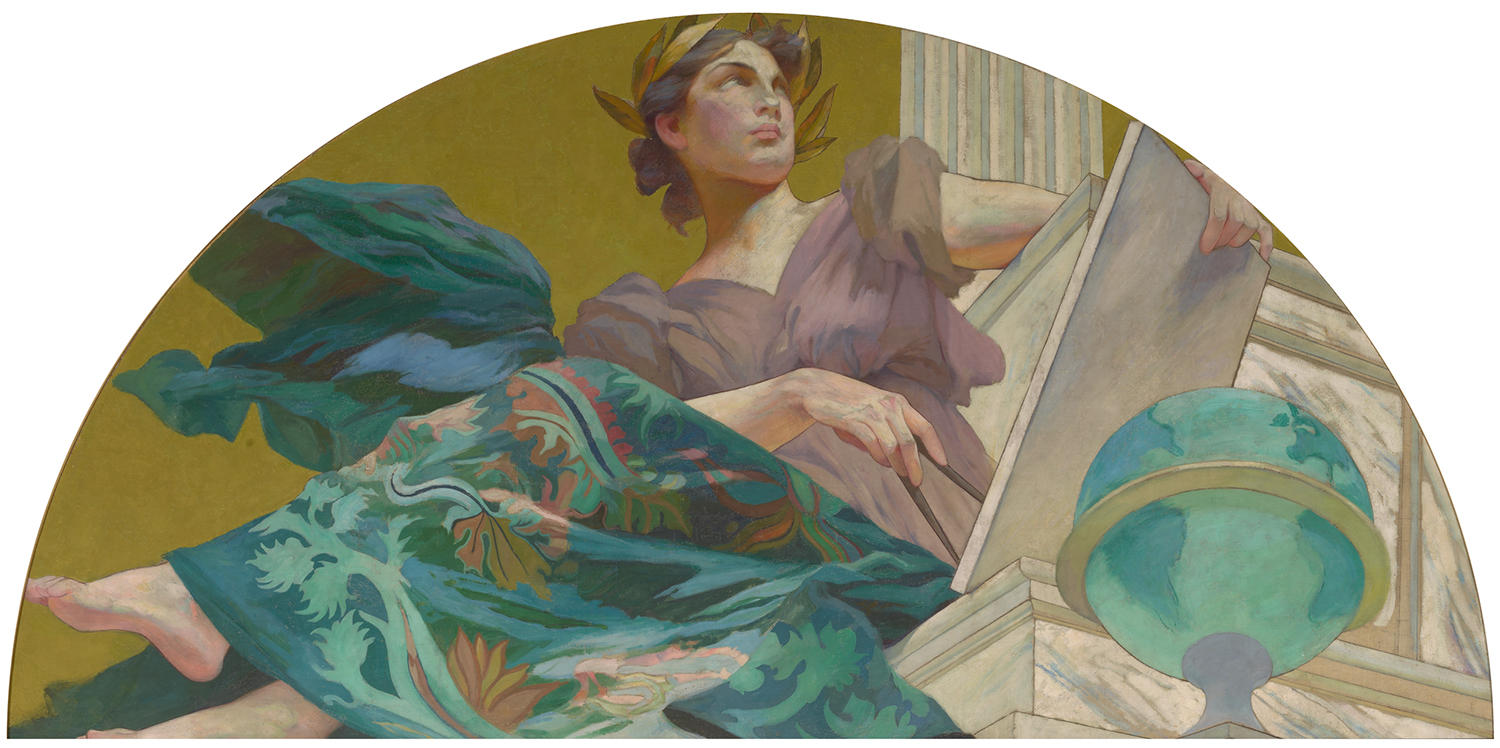 On a recent trip to the Yale University Art Gallery I was struck by these lunettes installed in a series high above the moulding of a gallery of 19th century American paintings.
On a recent trip to the Yale University Art Gallery I was struck by these lunettes installed in a series high above the moulding of a gallery of 19th century American paintings.
Painted by by Harry Siddons Mowbray they were commissioned as part of a large decorative scheme for the New York mansion of railroad tycoon Collis Potter Huntington. Six of the muses are traditional, while Mowbray invented three new ones — Painting, Agriculture and Science and Electricity.
At first thier cumulative effect was somewhat disorienting – they’re mounted so high that they sit nearly past the terminal angle of the neck. I had to bend backwards to take them in fully. Once I could focus though, I was mesmerized. What a presence each possessed, enhanced by their slightly exaggerated perspectives. And what vivid style — watery and fluid coloring held taught by graphic contours — a gorgeous hybrid evoking academic painting, vintage advertising illustration, social realist propaganda and heroic comics. Make my muses Mowbray’s!
More information here. From the top: Muse of Electricity, Muse of Painting, Muse of Agriculture, Muse of Music, Muse of Lyric Poetry, Muse of Tragedy, Muse of Comedy, Muse of Astronomy.
Bebe’s corduroy voice,
a Chesterfield burr —
unspools & old ropes give way
and the drawbridge drops
across the sunken court.She stayed behind,
to man the parapet
while the movable feast’s last course
played out
a styrofoam farce.We slept in the old chapel
littered with espionage scripture.
Stations of the jet set,
gilded frames ajar —Every Tuk-tuk driver in Lisbon will tell you
a bout the earthquake on All Saint’s Day
that leveled the churches
but spared the brothels.So — Cast your fishnets
and collect billets in the chapel of bones.
Vacuum the apse —
AstroTurf the courtyard —
Hoist that orange extension cord high!
Draw the current —
Scaffold the nave —
Drop the cloth —
Nail it across walls
whose scored stones
give history
familiar grip —
while the plaster dust remains
as timeless as the air
that forms the changeless notes
she pumps through the old organ.
Pressed into my hand by a fan, the poetry of David Berman confounded all expectations. Based on the reputation of his band, Silver Jews, I expected something top shelf, but sheesh. Quoting back cover blurbs is lazy, but James Tate gets it exactly – one after another, the poems in Actual Air “freeze life in impossible contortions.” Bingo! And, it’s a visual notion, those “contortions,” which helps explain why all the associations the work evoked for me were visual as well.
Besides fleeting vignettes, a melange of the worn south, bad advertising, and snippets of sci-fi, I kept thinking of a certain strain of pop art – the kind with some heaviness of meaning, of weight, at it’s core. Ruscha’s word paintings kept shimmering into focus, along with flashes of the instillation art of Ed Kienholz and the melancholy noir pop collages of Alexis Smith.
I think the Rauschenberg fan comes the closest to the sensation of reading the poems, though. At rest the phrases feel out of context. As it begins to spin and whirr, the phrases merge and mesh into coherence. As it spins down again it leaves you having experienced something singular, poignant, and fleeting.
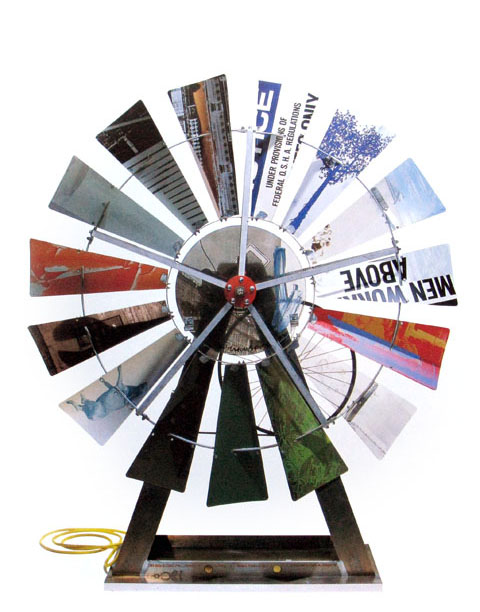
Mr. Rossetti has been known for many years as a painter of exceptional powers, who, for reasons best known to himself, has shrunk from publicly exhibiting his pictures, and from allowing anything like a popular estimate to be formed of their qualities. He belongs, or is said to belong, to the so—called Pre~Raphaelite school, a school which is generally considered to exhibit much genius for colour, and great indifference to perspective. It would be unfair to judge the painter by the glimpses we have had of his works, or by the photographs which are sold of the principal paintings judged by the photographs, he is an artist who conceives unpleasantly, and draws ill.
Like Mr. Simeon Solomon, however, with whom he seems to have many points in common, he is distinctively a colourist, and of his capabilities in colour we cannot speak, though we should guess that they are great; for if there is any good quality by which his poems are specially marked, it is a great sensitiveness to hues and tints as conveyed in poetic epithet. These qualities, which impress the casual spectator of the photographs from his pictures, are to be found abundantly among his verses.
There is the same thinness and transparence of design, the same combination of the simple and the grotesque, the same morbid deviation from healthy forms of life, the same sense of weary, wasting, yet exquisite sensuality; nothing virile, nothing tender, nothing completely sane; a superfluity of extreme sensibility, of delight in beautiful forms, hues, and tints, and a deep seated indifference to all agitating forces and agencies, all tumultuous griefs and sorrows, all the thunderous stress of life, and all the straining storm of speculation.
Mr. Morris is often pure, fresh, and wholesome as his own great model; Mr, Swinburne startles us more than once by some fine flash of insight; but the mind of Mr. Rossetti is like a glassy mere, broken only by the dive of some water—bird or the hum of winged insects, and brooded over by an atmosphere of insufferable closeness, with a light blue sky above it, sultry depths mirrored within it, and a surface so thickly sown with water~lilies that it retains its glassy smoothness even in the strongest wind. Judged relatively to his poetic associates, Mr. Rossetti must be pronounced inferior to either. He cannot tell a pleasant story like Mr. Morris, nor forge alliterative thunderbolts like Mr. Swinburne. It must be conceded, nevertheless, that he is neither so glibly imitative as the one, nor so transcendentally superficial as the other.
We at once recognize as his own property such passages as this:
I looked up
And saw where a brown—shouldered harlot leaned
Half-through a tavern window thick with vine.
Some man had come behind her in the room
And caught her by her arms, and she had turned
With that coarse empty laugh on him, as now
He munched her neck with kisses, while the vine
crawled in her back.Or this: —
As I stooped, her own lips rising there
Bubbled with brimming kisses at my mouth.Or this: —
Have seen your lifted silken skirt
Advertise dainties through the dirt!Or this: —
What more prize than love to impel thee,
Grip and lip my limbs as I tell thee!Passages like these are the common stock of the walking gentlemen of the fleshly school. We cannot forbear expressing our wonder, by the way, at the kind of women whom it seems the unhappy lot of these gentlemen to encounter. We have lived as long in the world as they have, but never yet came across persons of the other sex who conduct themselves in the manner described. Females who bite, scratch, scream, bubble, munch, sweat. writhe, twist, wriggle, foam, and in a general way slaver over their lovers, must surely possess some extraordinary qualities to counteract their otherwise most offensive mode of conducting themselves. It appears, however, on examination, that their poet—lovers conduct themselves in a similar manner. They, too, bite, scratch, scream, bubble, munch, sweat, writhe, twist, wriggle, foam, and slaver, in a style frightful to hear of. Let us hope that it is only their fun, and that they don’t mean half they say. At times, in reading such books as this, one cannot help wishing that things had remained for ever in the asexual state described in Mr. Darwin‘s great chapter on Palingenesis. We get very weary of this protracted hankering after a person of the other sex; it seems meat, drink, thought, sinew, religion for the fleshy school.
Robert Williams Buchanan onDante Gabriel Rossetti
Contemporary Review, October 1871.
FIVE HOUSES DOWN
By Christian WimanI loved his ten demented chickens
and the hell-eyed dog, the mailbox
shaped like a huge green gun.
I loved the eyesore opulence
of his five partial cars, the wonder-cluttered porch
with its oilspill plumage, tools
cauled in oil, the dark
clockwork of disassembled engines
christened Sweet Baby and benedicted Old Bitch;
and down the steps into the yard the explosion
of mismatched parts and black scraps
amid which, like a bad sapper cloaked
in luck, he would look up stunned,
patting the gut that slopped out of his undershirt
and saying, Son,
you lookin’ to make some scratch?
All afternoon we’d pile the flatbed high
with stacks of Exxon floormats
mysteriously stencilled with his name,
rain-rotted sheetrock or miles
of misfitted pipes, coil after coil
of rusted fencewire that stained for days
every crease of me, rollicking it all
to the dump where, while he called
every ragman and ravened junkdog by name,
he catpicked the avalanche of trash
and fished some always fixable thing
up from the depths. Something
about his endless aimless work
was not work, my father said.
Somehow his barklike earthquake curses
were not curses, for he could goddam
a slipped wrench and shitfuck a stuck latch,
but one bad word from me
made his whole being
twang like a nail mis-struck. Aint no call for that,
son, no call at all. Slipknot, whatknot, knot
from which no man escapes—
prestoed back to plain old rope;
whipsnake, blacksnake, deep in the wormdirt
worms like the clutch of mud:
I wanted to live forever
five houses down
in the womanless rooms a woman
sometimes seemed to move through, leaving him
twisting a hand-stitched dishtowel
or idly wiping the volcanic dust.
It seemed like heaven to me:
beans and weenies from paper plates,
black-fingered tinkerings on the back stoop
as the sun set, on an upturned fruitcrate
a little jamjar of rye like ancient light,
from which, once, I took a single, secret sip,
my eyes tearing and my throat on fire.
George & the Dragon
John BurnsideThis killing will never stop.
It’s not enough
to slay the beast, he has to make it clear
how calm his loathing is, how utterly devoid
of fellow feeling;and though she is present,
the woman is incidental;
whatever he hoped in the past, he’s not here, now,
for the wet of her mouth on his skin, or his curdled handstangling in the spilt folds
of her gown.
It isn’t love he lacks. It’s narrative.
The gown is red, which symbolisesotherworldly grace, or else
protection from the witchery of blood
– it’s hard to say
what ritual this is. All we can knowfor sure is that too much is being
sacrificed, the dragon with its throat
transpierced, a sign
left over from the damp, pre-Christian world,led from the cave on its chain (the woman holds it
lightly in her hand) to be destroyed
for no good reason, given that it’s tame
and captive now.Perhaps it’s just too green
or too expressive, set against this knight
whose mind is elsewhere, blank as ordinance
and formal, like the host, or likethis seeming bride-to-be, whose only love
is senseless agape.
No guessing what lightens their days; no guessing
how quietly each soul upholds its greydominion, at the near edge of a marsh
that runs into the dark
forever, gulls
and egrets flickering acrossits waterlands, a salt wind in the grass
so like a voice, the body longs
to follow;
but they never leave this spot
where flesh is conquered, time and time again,the lance fixed in the dragon’s
larynx, old blood
cooling in the sand, like candlewax,
the cave a myth, the storm, mere ornamentthe new god in the throne room
of high heaven,
observing our trespasses, judging us,
keeping us pure..
Her arrow-straight hair will not escape from its bow. Her glasses will never slide down her nose. From now on her base will be Boston. She will tell the passengers tied to their seats how she and our captain are going to be divorced. Her voice has made up its mind.
On Dumbo, a great grey beast, we head north towards Philadelphia, over an ambiguous fog where turtles swim in mud which is neither sky nor sea. The turtles are only four inches long. Their small paws are webbed. Their shells are surprisingly sensitive. We know which way they are going.
Who can tell what an elephant will do? In the hook of Dumbo’s trunk, Captain Wright swings like a broken bell, as if he’s drunk or piloting an invisible bomber running out of fuel. Soon his shoes will drop from his feet, two birds plummet to earth. O blue stewardess with red striped cuffs, we hope you enjoy your fight.
– Phyllis Janowitz, Soon The Final Decree
Esquire Magazine, June 1977. Janowitz is a poet, and Professor of English, at Cornell University. Also, yup, the mother of Tama Janowitz, author of 80’s novel / artifact Slaves of New York.
written, as is, May 18th, 2012, with a single word removed. Carriage returns added.
Flipping through a dense stack of auction catalogs I came across this oddity – an unassuming, glossy softcover book with a cheap, haphazardly typeset title, The Adventures of Mr and Mrs Jim and Ron. It’s a 1970 collaboration between poet Ron Padgett and pop expressionist artist Jim Dine.
The poems are just fantastic – prime specimens of a sort I’m a helpless sucker for. They’re short dreamy little narratives, shot through with strange shifts, breaks and fissures amongst the phrases. Odd juxtapositions emerge, only to be smoothed together by easy grammatical connections. It’s like a slow pan across a radio dial tuned to the psychic landscape of America – pocket buy vicodin reviews dramas, aspirations, product instructions, laconic observations, snippets of philosophy, fragment of bracing truths. They evoke, at times, Lydia Davis’ flash fiction, Ann Magnuson and Laurie Anderson’s brainy free associative monologues, Eve Babitz’s LA stories. Silver Jew David Berman’s poems too, here and there. Based on this book, this Padgett cat should be a joy to explore.
Jim Dine’s artwork is ok. I like Dine fine, and some of it’s sharp and smart (like the excerpts above), but the bulk of it is a too doodle-y and dashed off compared to the well turned poems they accompany. Still, the whole book is well worth tracking down.
They did not intend to distinguish between the essence
Of wit and wallpaper trellis.
What they cared
Was how the appointments of the age appeared
Under the citron gaslight incandescence.Virtue was vulgar, sin a floral passion
And death a hansom at the door, while they
Kept faith with a pomaded sense of history In their fashion.Behind the domino, those fringed and fanned
Exclusive girls, prinked with the peacock’s eye
Noted, they believed, the trickle of a century
Like a thin umbrella in a black-gloved hand.– Yellow Book, Muriel Spark, c. 1951 (photograph, One More, by Mariczka, Kharkiv Oblast, Ukraine)
Batshit. Pardon the vernacular, but it’s really the only way to describe Algernon Charles Swinburne’s poem Cleopatra. What ridiculous swoops of melodrama. Overripe to the point of sugary bursting. It begins with a vivid litany of Cleopatra’s superlative qualities. It quickly unravels into a hysterical parade of phantasmagoric noodling – histories crushed under her eyelids, something about molten heaven drier than sand, and culminating in a psychedelic apocalypse. Or something. But of course it’s all a dream, but the dream of a lurid goddess, laughing with a red sweet mouth of wine, with history itself under her sway. Superb stuff, enjoy! (By the way Swinburne’s story is riveting and well, well worth reading.)
HER mouth is fragrant as a vine,
A vine with birds in all its boughs;
Serpent and scarab for a sign
Between the beauty of her brows
And the amorous deep lids divine.Her great curled hair makes luminous
Her cheeks, her lifted throat and chin.
Shall she not have the hearts of us
To shatter, and the loves therein
To shred between her fingers thus?Small ruined broken strays of light,
Pearl after pearl she shreds them through
Her long sweet sleepy fingers, white
As any pearl’s heart veined with blue,
And soft as dew on a soft night.As if the very eyes of love
Shone through her shutting lids, and stole
The slow looks of a snake or dove;
As if her lips absorbed the whole
Of love, her soul the soul thereof.Lost, all the lordly pearls that were
Wrung from the sea’s heart, from the green
Coasts of the Indian gulf-river;
Lost, all the loves of the world—so keen
Towards this queen for love of her.You see against her throat the small
Sharp glittering shadows of them shake;
And through her hair the imperial
Curled likeness of the river snake,
Whose bite shall make an end of all.Through the scales sheathing him like wings,
Through hieroglyphs of gold and gem,
The strong sense of her beauty stings,
Like a keen pulse of love in them,
A running flame through all his rings.Under those low large lids of hers
She hath the histories of all time;
The fruit of foliage-stricken years;
The old seasons with their heavy chime
That leaves its rhyme in the world’s ears.She sees the hand of death made bare,
The ravelled riddle of the skies,
The faces faded that were fair,
The mouths made speechless that were wise,
The hollow eyes and dusty hair;The shape and shadow of mystic things,
Things that fate fashions or forbids;
The staff of time-forgotten Kings
Whose name falls off the Pyramids,
Their coffin-lids and grave-clothings;Dank dregs, the scum of pool or clod,
God-spawn of lizard-footed clans,
And those dog-headed hulks that trod
Swart necks of the old Egyptians,
Raw draughts of man’s beginning God;The poised hawk, quivering ere he smote,
With plume-like gems on breast and back;
The asps and water-worms afloat
Between the rush-flowers moist and slack;
The cat’s warm black bright rising throat.The purple days of drouth expand
Like a scroll opened out again;
The molten heaven drier than sand,
The hot red heaven without rain,
Sheds iron pain on the empty land.All Egypt aches in the sun’s sight;
The lips of men are harsh for drouth,
The fierce air leaves their cheeks burnt white,
Charred by the bitter blowing south,
Whose dusty mouth is sharp to bite.All this she dreams of, and her eyes
Are wrought after the sense hereof.
There is no heart in her for sighs;
The face of her is more than love—
A name above the Ptolemies.Her great grave beauty covers her
As that sleek spoil beneath her feet
Clothed once the anointed soothsayer;
The hallowing is gone forth from it
Now, made unmeet for priests to wear.She treads on gods and god-like things,
On fate and fear and life and death,
On hate that cleaves and love that clings,
All that is brought forth of man’s breath
And perisheth with what it brings.She holds her future close, her lips
Hold fast the face of things to be;
Actium, and sound of war that dips
Down the blown valleys of the sea,
Far sails that flee, and storms of ships;The laughing red sweet mouth of wine
At ending of life’s festival;
That spice of cerecloths, and the fine
White bitter dust funereal
Sprinkled on all things for a sign;His face, who was and was not he,
In whom, alive, her life abode;
The end, when she gained heart to see
Those ways of death wherein she trod,
Goddess by god, with Antony.
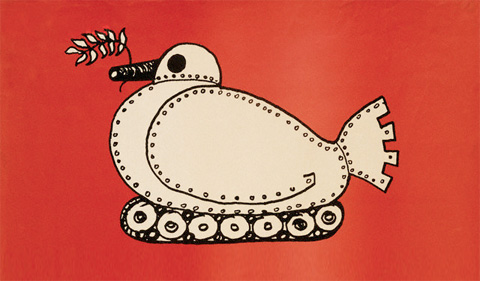
The Power of Taste
Zbigniew HerbertIt didn’t require great character at all
our refusal disagreement and resistance
we had a shred of necessary courage
but fundamentally it was a matter of taste
…Yes taste
in which there are fibers of soul the cartilage of conscienceWho knows if we had been better and more attractively tempted sent
rose-skinned women thin as a wafer
or fantastic creatures from the paintings of Hieronymus Bosch
but what kind of hell was there at this time
a wet pit the murderers’ alley the barrack
called a palace of justice
a home-brewed Mephisto in a Lenin jacket
sent Aurora’s grandchildren out into the field
boys with potato faces
very ugly girls with red handsVerily their rhetoric was made of cheap sacking
(Marcus Tullius kept turning in his grave)
chains of tautologies a couple of concepts like flails
the dialectics of slaughterers no distinctions in reasoning
syntax deprived of beauty of the subjunctiveSo aesthetics can be helpful in life
one should not neglect the study of beautyBefore we declare our consent we must carefully examine
the shape of the architecture the rhythm of the drums and pipes
official colors the despicable ritual of funeralsOur eyes and ears refused obedience
the princes of our senses proudly chose exileIt did not require great character at all
we had a shred of necessary courage
but fundamentally it was a matter of taste
…Yes taste
that commands us to get out to make a wry face draw out a sneer
even if for this the precious capital of the body the head
must fall
(art: Pax Sovietica Polish Solidarity Movement Poster, 1980s, © Stapleton Collection)

Barbados teams with Darlene Swimwear, circa 1966, to make a level-headed, brass-tacks case for increased tourism to this picturesque island nation. Strange thing is, on closer reading, the text is a little fractured, off kilter – taking on, nearly, the cadence of verse. So here, in the spirit of summer, for your pleasure, a bit of found doggerel:
DO DO BARBADOS
Darlene does two piece for the show
at Silver Sands Beach.
Beautiful Ban-Lon
with crochet trim and boy leg.Baby pink,
Lemon,
Turquoise,
Black.Sizes 8 to 16
Do Do Barbados
Sun ceilinged, sea surrounded.
West Indian place
of happy exile.Fly BWIA
the airline of the CaribbeanA round of happy smiles
pipes you aboard.
In little less than five friendly hours
you start your island affair
with the idol of the West Indies.For flight information see your travel agent.
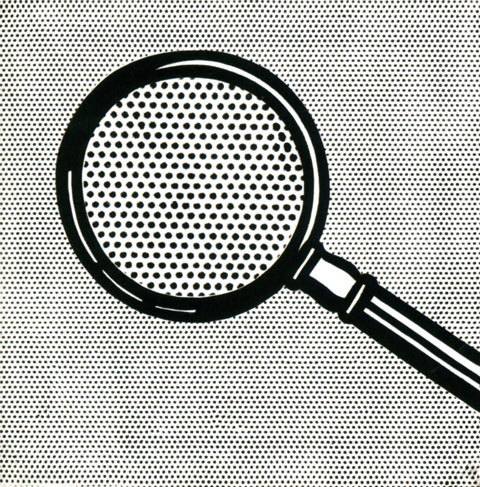
NOTHING VENTURED
Nothing exists as a block
and cannot be parceled up.
So if nothing is ventured
it’s not just talk;
it’s the big wager
Don’t you wonder
how people think
the banks of space
and time don’t matter?
How they’ll drain
the big tanks down to
slime and salamanders
and want thanks?
REPULSIVE THEORY
Little has been made
of the soft, skirting action
of magnets reversed,
while much has been
made of attraction.
But is it not this pillowy
principle of repulsion
that produces the
doily edges of oceans
or the arabesques of thought?
And do these cutout coasts
and incurved rhetorical beaches
not baffle the onslaught
of the sea or objectionable people
and give private life
what small protection it’s got?
Praise then the oiled motions
of avoidance, the pearly
convolutions of all that
slides off or takes a
wide berth; praise every
eddying vacancy of Earth,
all the dimpled depths
of pooling space, the whole
swirl set up by fending-off—
extending far beyond the personal,
I’m convinced—
immense and good
in a cosmological sense:
unpressing us against
each other, lending
the necessary never
to never-ending.
Kay Ryan’s poems are a public service. They burrow into the overlooked and taken-for-granted and uncover something intrinsic and valuable. Her contribution lies in recovering buy vicodin on silk road insight trapped in cliches and bromides. Her poems pause to illuminate the darkness just before dawn, linger over the texture of the fabric of life, and note the passing of water under the bridge. In Nothing Ventured she detects the weight and scale of nothing itself, and marvels at how casually we gamble it away. She is also a consummate observer of the whirring gizmos of existence. Indeed, “little has been made of the soft skirting action of magnets reversed.” By the end of Repulsive Theory, the lovingly rendered “pillowy principle of repulsion” is invested with a precise and staggering physical and poetic power, doodling the edges of continents, “unpressing us against each other, lending the necessary never to never-ending.” Now our Poet Laureate, all her books are endlessly rewarding, and while some are rare, Niagara River, Elephant Rocks and Say Uncle are easily found. A great overview can be found here. (Image: Roy Lictenstein, Magnifying Glass, 1963)